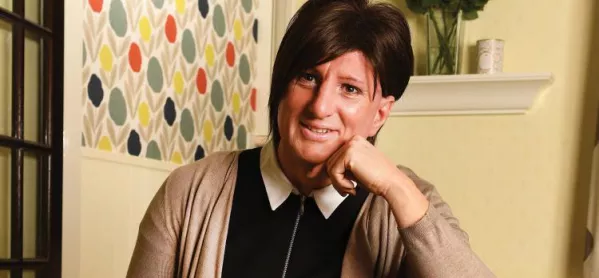- Home
- ‘Transphobia is hurtful and destructive. We need a specific day when schools show trans people that society cares’
‘Transphobia is hurtful and destructive. We need a specific day when schools show trans people that society cares’

As November’s Transgender Day of Remembrance (TDoR) approaches (November 20), I ask myself: how many schools will acknowledge this day or discuss it in some way with children?
In an already-packed school year, it is possibly a day that could be overlooked. This may be because acceptance of trans people will be discussed this week, during anti-bullying week. The conversation may centre around transphobic attitudes and language to highlight “hate” and as part of a process to eradicate victimisation, discrimination and harassment.
Therefore, to discuss trans people again would somehow seem unwarranted - and possibly even excessive, to some. It could also be that schools are reluctant to draw attention to this particular day because of how it may be perceived by the wider community, especially because transgender young people are discussed in mainstream media with regularity - inviting a multitude of differing opinion.
However, given recent events, particularly tension surrounding possible changes to the Gender Recognition Act 2004, it is more important than ever to make space for this important day in the school calendar.
Transgender awareness
I am certain that school leaders across the education community will have read with interest comments made by Theresa May in her speech during the Pink News Awards in October.
Mrs May used this opportunity to outline her vision for LGBT inclusion in society, - and to give clear and absolute support for trans people. She stated that: “being trans is not an illness and it shouldn’t be treated as such.”
As a trans woman, this was extremely heartening to hear. I’m convinced that my feelings would have been replicated across the trans and ally community because, in a stroke, the prime minister was attempting to depathologise our identity and reiterate that we are very much part of the richness of human diversity. Well, that was my interpretation.
The prime minister went even further by recognising that “trans people still face indignities and prejudice.” Significantly, she indicated firmly that “bullying in schools and on social media is still a daily reality for young LGBT people and that has to stop” and that her government is determined to “eradicate homophobic and transphobic bullying” and “making sure that LGBT issues are taught well.”
Greater scrutiny
I sense that this unwavering rhetoric from the prime minister, highlighting the negative school experience for many young LGBT people, suggests there will be greater scrutiny from the Department of Education and Ofsted with regards to LGBT inclusion, especially with relation to young trans people.
The issue of the welfare of young trans people was also picked up by the Good School Guide which, as reported by The Telegraph, will examine how “transgender-friendly” schools are for the first time in response to an increasing number of parents asking for “advice on which schools cater for the needs of transgender children.” David Isaac, the chair of the Equality and Human Rights Commission, also added his thoughts by stating that transgender children were being “failed by the system” and as such, schools are to be issued with the first national guidelines on transgender children. This is welcome news.
As the number of young people referred to the Gender Identity Development Service increases in number, it is imperative for schools to support the growing trans community whether in school or the wider world - the will from government, as shown, is certainly there.
TDoR is an opportunity to demonstrate to young people fundamental British values, fulfil public sector equality duty and reaffirm the ethos and values of the school. Thanks to social media, young people will be all too aware of TDoR. Therefore, to remain silent could be misinterpreted by young people as indicative of a school-wide transphobic attitude.
Creating space
As a former school leader, I understand how challenging it can be to create space for deep reflection in a busy school day, but as a trans woman I urge school leaders to somehow find that space - it could be during assembly or tutor time. I would suggest creating space on a notice board, too: the most prominent one in the school, the one the children stop to look at and read. Updating the school website to show the wider community that TDoR is being discussed would be extremely helpful and powerful as well. Finally, if you are a headteacher or a senior leader, please display the transgender colours on your door for all to see. Show the school community you are a “trans ally”.
Some trans people, such as me, are clearly visible. And some are not. Whether we can be seen or not, I can assure you we do exist.
Because of ignorance, lack of understanding and fear, the world can be a violent and unforgiving place for trans people. Transphobia is real. It is both hurtful and destructive. I should know because I have experienced it. It doesn’t have to be this way. TDoR is a chance to show trans people that society cares and that we belong in the world too.
In doing so, schools are helping to create a society that is fair and just for all. Although we may never know, quite possibly, discussing TDoR could save someone’s life.
Claire Birkenshaw is an equality and diversity advocate and a former headteacher
Want to keep up with the latest education news and opinion? Follow Tes on Twitter and Instagram and like Tes on Facebook
Keep reading for just £1 per month
You've reached your limit of free articles this month. Subscribe for £1 per month for three months and get:
- Unlimited access to all Tes magazine content
- Exclusive subscriber-only stories
- Award-winning email newsletters